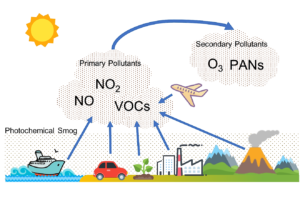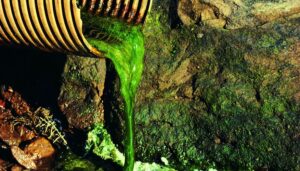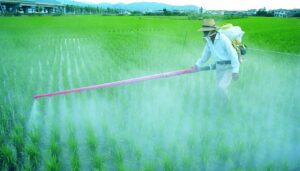Back to: Physical and Health Education Primary 3
Welcome to class!
In today’s class, we’re going to explore another important aspect of pollution – chemical pollution. We’ll learn what chemical pollution is and understand the common causes behind it.
Meaning and Causes of Chemical Pollution
Meaning of Chemical Pollution

Chemical pollution occurs when harmful chemicals are released into the environment, causing damage to the air, water, soil, and living organisms.
Causes of Chemical Pollution

Chemical pollution can be caused by various factors. Let’s look at some of the common causes:
Industrial Processes: Factories and industries often release chemicals and pollutants into the air and water. This can include chemicals used in manufacturing or waste products from production.
Pesticides and Herbicides: The use of chemical pesticides and herbicides in agriculture can lead to chemical pollution. These chemicals can end up in the soil and water, affecting ecosystems.

Waste Disposal: Improper disposal of chemicals and hazardous waste can lead to chemical pollution. Dumping toxic substances into rivers or landfills can be harmful.
Oil Spills: Accidental oil spills in oceans and seas can have severe consequences, releasing harmful chemicals into the water and affecting marine life.
Household Chemicals: Some everyday household products contain chemicals that, if not used or disposed of properly, can contribute to pollution.
Chemical pollution can have harmful effects on the environment, including contamination of water sources, harm to wildlife, and even health issues for humans.
Preventing Chemical Pollution
Preventing chemical pollution is vital for a cleaner and healthier environment. Here are some ways to help prevent it:
Safe Disposal: Always dispose of chemicals and hazardous waste in designated areas, following local regulations and guidelines.
Reducing Chemical Use: Use chemicals like pesticides and household cleaning products in moderation and according to instructions.
Recycling: Recycling helps reduce the need for producing new chemicals and products. It’s an eco-friendly way to minimize chemical pollution.
Understanding the meaning and causes of chemical pollution is crucial for preserving our environment and our health. By being aware of the sources of chemical pollution and taking steps to prevent it, we can make our world cleaner and safer for all living creatures.
So, let’s work together to prevent chemical pollution and ensure a healthier planet for ourselves and future generations!
We have come to the end of today’s class. I hope you enjoyed the class!
In the next class, we shall be discussing How to Prevent Chemical Pollution.
In case you require further assistance or have any questions, feel free to ask in the comment section below, and trust us to respond as soon as possible. Cheers!
Question Time
- What is chemical pollution, and how does it differ from other types of pollution, such as air or noise pollution?
- Why do factories and industries release chemicals into the air and water, and what are the potential consequences of this for the environment?
- How can the use of chemical pesticides and herbicides in agriculture lead to chemical pollution, and what ecosystems are affected by these chemicals?
- What are some negative effects of improper disposal of hazardous waste and toxic substances, and why is it essential to follow proper disposal guidelines?
